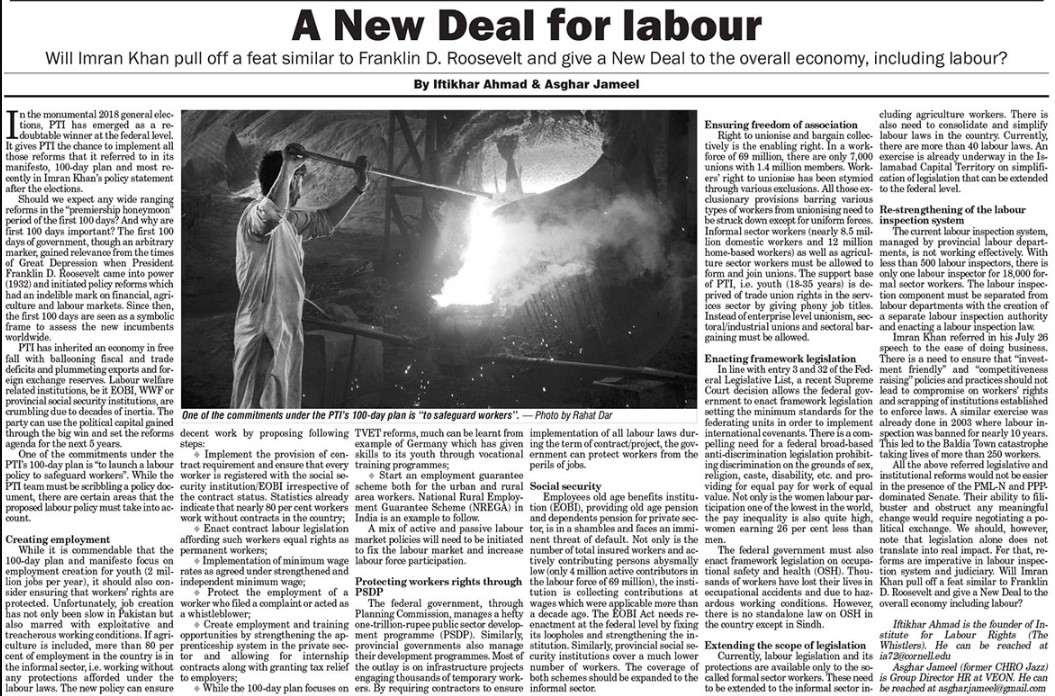
The article recommends protection of the right to freedom of association, right to social protection, extension of the scope of labour legislation to the uncovered sectors, enactment of framework legislation at the federal level and re-strengthening of labour inspection. While commending the hashtag#PTI’s proposal to create 2 million jobs per year, we suggest certain steps to ensure that these jobs turn into productive and gainful employment, i.e. hashtag#decentwork.
Will Imran Khan pull off a feat similar to Franklin D. Roosevelt and give a New Deal to the overall economy, including labour? In the monumental 2018 general elections, PTI has emerged as a redoubtable winner at the federal level. It gives PTI the chance to implement all those reforms that it referred to in its manifesto, 100-day plan and most recently in Imran Khan’s policy statement after the elections. Should we expect any wide ranging reforms in the “premiership honeymoon” period of the first 100 days? And why are first 100 days important? The first 100 days of government, though an arbitrary marker, gained relevance from the times of Great Depression when President Franklin D. Roosevelt came into power (1932) and initiated policy reforms which had an indelible mark on financial, agriculture and labour markets. Since then, the first 100 days are seen as a symbolic frame to assess the new incumbents worldwide. PTI has inherited an economy in free fall with ballooning fiscal and trade deficits and plummeting exports and foreign exchange reserves. Labour welfare related institutions, be it EOBI, WWF or provincial social security institutions, are crumbling due to decades of inertia. The party can use the political capital gained through the big win and set the reforms agenda for the next 5 years. One of the commitments under the PTI’s 100-day plan is “to launch a labour policy to safeguard workers”. While the PTI team must be scribbling a policy document, there are certain areas that the proposed labour policy must take into account. Creating employment While it is commendable that the 100-day plan and manifesto focus on employment creation for youth (2 million jobs per year), it should also consider ensuring that workers’ rights are protected. Unfortunately, job creation has not only been slow in Pakistan but also marred with exploitative and treacherous working conditions. If agriculture is included, more than 80 per cent of employment in the country is in the informal sector, i.e. working without any protections afforded under the labour laws. The new policy can ensure decent work by proposing following steps:
Will Imran Khan pull off a feat similar to Franklin D. Roosevelt and give a New Deal to the overall economy, including labour? In the monumental 2018 general elections, PTI has emerged as a redoubtable winner at the federal level. It gives PTI the chance to implement all those reforms that it referred to in its manifesto, 100-day plan and most recently in Imran Khan’s policy statement after the elections. Should we expect any wide ranging reforms in the “premiership honeymoon” period of the first 100 days? And why are first 100 days important? The first 100 days of government, though an arbitrary marker, gained relevance from the times of Great Depression when President Franklin D. Roosevelt came into power (1932) and initiated policy reforms which had an indelible mark on financial, agriculture and labour markets. Since then, the first 100 days are seen as a symbolic frame to assess the new incumbents worldwide. PTI has inherited an economy in free fall with ballooning fiscal and trade deficits and plummeting exports and foreign exchange reserves. Labour welfare related institutions, be it EOBI, WWF or provincial social security institutions, are crumbling due to decades of inertia. The party can use the political capital gained through the big win and set the reforms agenda for the next 5 years. One of the commitments under the PTI’s 100-day plan is “to launch a labour policy to safeguard workers”. While the PTI team must be scribbling a policy document, there are certain areas that the proposed labour policy must take into account. Creating employment While it is commendable that the 100-day plan and manifesto focus on employment creation for youth (2 million jobs per year), it should also consider ensuring that workers’ rights are protected. Unfortunately, job creation has not only been slow in Pakistan but also marred with exploitative and treacherous working conditions. If agriculture is included, more than 80 per cent of employment in the country is in the informal sector, i.e. working without any protections afforded under the labour laws. The new policy can ensure decent work by proposing following steps:
- Implement the provision of contract requirement and ensure that every worker is registered with the social security institution/EOBI irrespective of the contract status. Statistics already indicate that nearly 80 per cent workers work without contracts in the country;
- Enact contract labour legislation affording such workers equal rights as permanent workers;
- Implementation of minimum wage rates as agreed under strengthened and independent minimum wage;
- Protect the employment of a worker who filed a complaint or acted as a whistleblower;
- Create employment and training opportunities by strengthening the apprenticeship system in the private sector and allowing for internship contracts along with granting tax relief to employers;
- While the 100-day plan focuses on TVET reforms, much can be learnt from example of Germany which has given skills to its youth through vocational training programmes;
- Start an employment guarantee scheme both for the urban and rural area workers. National Rural Employment Guarantee Scheme (NREGA) in India is an example to follow.


